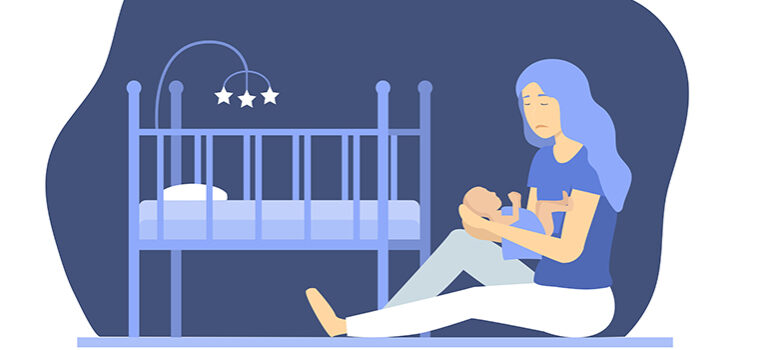Amber Parden, MD
What if the “happiest time of your life” doesn’t feel so happy? Well you’re not alone. While it may seem like everyone you know joyfully and effortlessly transitioned into motherhood, many women experience feelings of sadness or anxiety. In fact, mental health conditions are the most common complications of pregnancy and childbirth, affecting approximately 1 in 5 women.
Perinatal Mood and Anxiety Disorders (PMAD)
A lot of hormonal changes occur in a woman’s body during the child bearing process. First they increase to sustain a healthy pregnancy, then they drop immediately following delivery. As a result, many women experience significant symptoms of depression and anxiety during their pregnancy and up to one year or longer after childbirth. (Not to mention having a baby is a huge life event!)
These maternal mental health conditions, or Perinatal Mood and Anxiety Disorders (PMADs), include a range of depression, mood and anxiety orders including:
- Baby Blues: This is the normal mood changes, weepiness, and general feeling of being overwhelmed women often experience when their hormone levels drop after delivery. It can feel like an emotional rollercoaster that starts within days of giving birth, peaks at 4-5 days and goes away on its own in about two weeks.
- Postpartum Depression: PPD has been described by some as “the baby blues on a loudspeaker.” Feelings of sadness, guilt, fear and inadequacy as a mother become overwhelming feelings. Anxiety, restlessness and inability to sleep even when exhausted is common in postpartum depression. It may start as early as the second or third day after birth or take several weeks to a year to develop.
- Postpartum Anxiety and OCD: Postpartum Anxiety and/ or OCD can feel physical like shortness of breath, dizziness, nausea and headaches. The emotions are constant worry, racing thoughts, and inability to sleep. Scary thoughts about bad things happening to you or the baby can be very upsetting and common with postpartum anxiety and OCD.
- Postpartum Psychosis: Psychosis is a rare illness involving your thoughts and senses. Rapid mood changes from feeling high/manic or agitated to low and depressed mood can occur. Not sleeping, strange beliefs, hallucinations, confusion and difficulty communicating are among the symptoms.
Signs and Symptoms
Since hormones and emotions are closely connected, it’s normal to experience changing moods, weepiness or feel overwhelmed. While symptoms of PMADs can vary, there are some important signs that may indicate your feelings are more than the normal “baby blues.” They include:
- Intense anger, worry or unhappiness
- Extreme mood swings and low frustration tolerance
- Difficulty caring for yourself or your baby
- Less interest in things you used to enjoy
- Changes in your eating or sleeping habits
Risk Factors for PMAD
All child bearing women are at risk of PMADs because of the extreme hormonal fluctuations caused by pregnancy and childbirth. However, there are some factors that do make some women more susceptible:
- A history of depression or anxiety, either during pregnancy or at other times
- Family history of depression or anxiety
- A difficult pregnancy or birth experience
- Giving birth to twins or other multiples
- Experiencing problems in your relationship with your partner
- Experiencing financial problems
- Receiving little or no support from family or friends to help you care for your baby
- Unplanned pregnancy
Reducing You Risk
While not all PMADs are preventable, there are some steps you can take that may reduce your symptoms or lower your risk:
- Eat a balanced diet, exercise when possible, and try to get adequate sleep.
- Share your feelings with someone close to you. Don’t isolate yourself at home.
- Don’t try to do everything for everyone. You do not need to be superwoman!
- Set realistic expectations for yourself.
- Don’t be ashamed of having emotional changes after your baby is born. It is very common.
- Ask for help from those around you.
Treatment
The good news is that Perinatal Mood and Anxiety Disorders are treatable. Use this checklist and talk to your doctor any time you are worried about the way you are feeling or thinking. He or she may suggest a check-up, medication or therapy with a professional who is trained to help you, which is where I come in!
Woman’s Behavioral Health Service
I am a double board certified child, adolescent, and adult psychiatrist with a passion for perinatal mental health. I provide treatment to women suffering from peripartum and postpartum anxiety and depression, focusing on medication management and psychotherapy treatment plans.
Moms’ mental health matters. It impacts how you care for yourself and your children. If something doesn’t feel right talk to your doctor or call Woman’s Behavioral Health Clinic at 225-215-7498, help is waiting!
You can help Woman’s meet challenges such as this facing women in our community by making a gift today.

